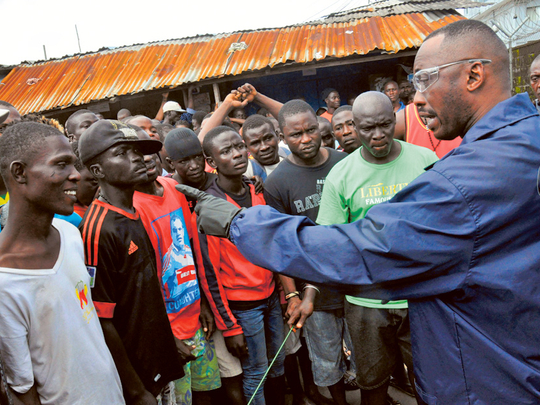
ABIDJAN: Ivory Coast has closed its land borders with Ebola-affected West African neighbours Guinea and Liberia in an attempt to prevent the world’s deadliest outbreak of the virus from spreading to its territory, the government said.
“Faced with new outbreak sites and the reactivation of old sites ... the Ivorian government decides to close its land borders with sister republics Guinea and Liberia,” said a statement read on state-owned television late on Friday.
The true number of Ebola virus cases in West Africa has been underestimated partly because of the existence of “shadow zones” and the hiding of sick individuals by family members, according to the World Health Organisation.
In a statement issued by the United Nations health agency on Friday, officials listed several reasons why authorities have been unable to accurately calculate the magnitude of the outbreak.
The list included the existence of shadow zones, or small villages where rumours of an outbreak could not be investigated because of “community resistance” or lack of staff or vehicles.
“Many families hide infected loved ones in their homes,” the statement read. “As Ebola has no cure, some believe infected loved ones will be more comfortable dying at home. ... In rural villages, corpses are buried without notifying health officials and with no investigation of the cause of death. In some instances, epidemiologists have travelled to villages and counted the number of fresh graves as a crude indicator of suspected cases.”
As of Friday, the WHO had estimated a total of 2,615 cases of Ebola with 1,427 deaths in Guinea, Liberia, Sierra Leone and Nigeria. The outbreak was first detected in March.
In a telephone news conference from the Liberian capital of Monrovia on Friday, WHO Assistant Director-General for Health and Security Keiji Fukuda estimated that the epidemic would last another six to nine months.
“We hope to see a decrease in cases before that,” Fukuda said. “But we know that Ebola is an infection that will take a while to get rid of, and so this is simply an estimate.”
Fukuda and other WHO officials had spent two days talking with Liberian government officials and aid agencies about responding to the Ebola crisis and expanding medical capacity.
As resources had been shifted to deal with the outbreak, people were not getting care for non-Ebola-related health problems, a secondary effect of the crisis that will grow more serious as time goes on.
Fukuda said that plans were in the works to provide up to 500 more Ebola care beds in Monrovia in the next six weeks.
At the same time, WHO officials said that the government and aid organisations had to ensure that quarantined areas received food and other aid.
“The situation is not a hopeless situation,” Fukuda said. “Ebola is not a new disease. ... It is clear when patients are given the right treatment early enough it makes a difference. People survive this disease.”
Meanwhile, a poll conducted by the Harvard School of Public Health (HSPH) revealed most Americans are not fully aware about the deadly disease Ebola.
Nearly 39 per cent adult Americans believe that there will be a large outbreak in the US and 26 per cent are concerned that someone in their family may get sick with Ebola over the next year.
The poll found that people with less education are more likely to be concerned about an outbreak in the US.
“Those with less education are also less likely to be following the news about the Ebola outbreak in West Africa closely,” said the findings.
A third of the people who participated in the poll believe there is “an effective medicine to treat people who have gotten sick with Ebola”.
“Many people are concerned about a large scale outbreak of Ebola occurring in the US,” said Gillian SteelFisher from Harvard School of Public Health.
Ebola is not an airborne illness and is transmitted through direct contact with infected bodily fluids, infected objects or infected animals.
According to the World Health Organisation (WHO), there is no proven antiviral medicine to counter Ebola. However, treating symptoms — such as maintaining fluids, oxygen levels, and blood pressure — can increase the odds of survival.












